Saturday Feb 21, 2026
Saturday Feb 21, 2026
Tuesday, 22 November 2016 00:15 - - {{hitsCtrl.values.hits}}
By Charumini de Silva
The Daily FT-Colombo University MBA Alumni Association organised 2017 Post Budget Forum in association with HSBC last week highlighted several key insights in to the Government's latest fiscal program as well as medium term plans.
The popular annual post-Budget forum series this year brought a unique panel of listed multinational and majority foreign-owned listed and unlisted conglomerates to share key insights. Finance Minister Ravi Karunanayake was the Chief Guest. It was the first time a panel of this calibre came together at a single platform to speak for Sri Lanka and its future potential, hence drawing over 500 participants.
In Sri Lanka's interest, as well as to attract much needed foreign direct investments, a key thrust of the unity Government, several top firms came forward to serve in the expert panel and share their perspectives and insights at the Forum.
The panel comprised CHEC Port City Colombo Chief Sales and Marketing Officer Liang Thowming, Chevron Lubricants Lanka Plc , Managing Director/CEO Dr. Kishu Gomes, Glaxo SmithKline Consumer Chairman Sunil Mehra, Ceylon Tobacco Company Plc Finance Director Emma Ridley, Piramal Glass Ceylon Plc Managing Director/CEO Sanjay Tiwari, and Japan International Cooperation Agency Advisor for Board of Investment Hideo Horiguchi. Additionally PwC Tax Services Director Charmaine Tillekeratne and HSBC Sri Lanka and Maldives CEO Mark Prothero also shared their views.
The Technical Partner for this forum was PwC while the Creative Partner was Redworks, the Print Partner was Pixel, the Electronic Media Partner was Gold FM and the Pay TV Partner was Peo TV. Following are key insights shared at the Forum along with questions raised.
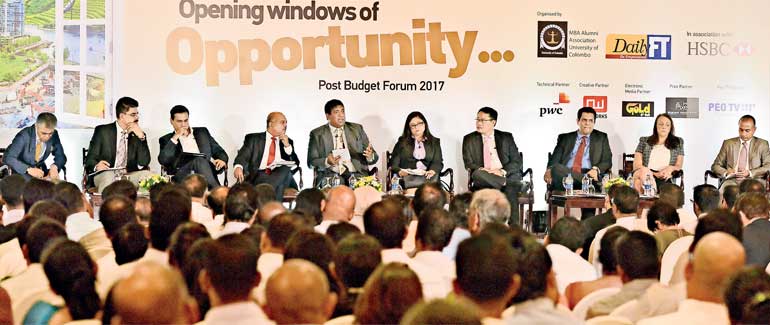
CHEC Port City Colombo Chief Sales and Marketing Officer Liang Thowming said Budget 2017 was a refreshing one from a Foreign Direct Investment (FDI) perspective, adding that there were a couple of proposals that were on their wish list that came true such as allowing foreigners to purchase apartments below the fourth floor and allowing foreigners to obtain loans with a loan to value (LTV) ratio up to 40%.
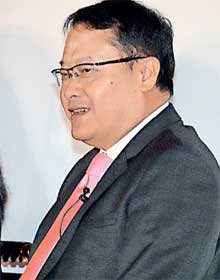 “Despite 40% not being of much significance, it was an improvement of over what was there before, hence it is a good start. I think going forward, what we hope for is to see further relaxation and I think there is a lot more we can do on this,” he added.
“Despite 40% not being of much significance, it was an improvement of over what was there before, hence it is a good start. I think going forward, what we hope for is to see further relaxation and I think there is a lot more we can do on this,” he added.
Noting that Port City is a global venture, which competes against Ho Chi Minh City, Malaysia and Singapore, he insisted that the Government come up with favourable policies as it tries to market the project to global investors.
“One of the things that needs to be highlighted is the Port City is not in competition with any other projects in Sri Lanka, but we are in competition with all the FDI destinations globally. We are talking about every city that is competing for ‘the’ FDI dollar. It is important that we see how we could position ourselves and make ourselves more attractive,” he explained.
At present there are more than 80 financial cities in the world and hence he pointed that it was crucial to address how Sri Lanka is going to differentiate from the rest of the competitors as Port City is going to come live very soon.
“I am sure you all witness the activity that is going on the site right now, after we have started work a month ago. I think we all can get excited what we are going to see on site and we are hopeful to be a major contributor to the economy of Sri Lanka,” Thowming said.
Chevron Lubricants Lanka Plc Managing Director/CEO Dr. Kishu Gomes said the overall Budget proposals and the measures taken 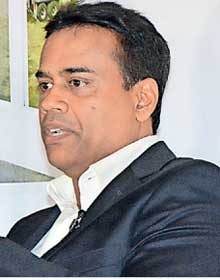 to tighten the fiscal situation by the Government were commendable.
to tighten the fiscal situation by the Government were commendable.
He said Corporate Tax at 28% is one of the lowest in the region and given the very tight fiscal situation they thought that the Government may take the decision to increase it up to 35% which did not happen. However, said as organisations it would increase their costs as well as taxes in few areas.
Gomes highlighted that multinational companies do not consider one particular Budget presented in a year, but they rather into account at the track record of a country when making decisions. Hence he stressed that policy consistency was paramount in retaining and attracting foreign investors. He hailed the proposal made to provide incentives for listing 25% of taxable income from the previous year, extension of probation period from six months to seven months, flexi hours and performance-based income package.
However in terms of listing he pointed that if the Government had some kind of tiered incentive scheme, it would have helped the country more. “When you look at all the listed companies there are companies with a public float of around 4% to 6% as against others with 49%, hence it is important we categories companies on the basis of their value creation. I think we need to go down to that level to ensure that these decision really pays off,” he added.
He urged the Government to come up with a matrix where they will really intensify the companies which would create maximum value for the country. “I think we need to think deeper than 150 employees being the minimum requirement to be eligible for incentives. We need to understand the overall value such companies can create by using local raw materials, local manufacturing, local services, export oriented firms in non-traditional areas that will bring in foreign exchange, employment mix of expatriates and locals and indirect employment.”
Noting that there are quite a lot of price controls imposed on few industries, Gomes said that those are some initiatives that are not welcomed by multinational firms as they always compare the situations with other countries. Furthermore, he pointed although it was a good decision to bring down the number of processes from eight to five in order to improve the competitiveness, it was more vital to develop an efficient system to execute those processes.
Ceylon Tobacco Company Plc Finance Director Emma Ridley said the 2017 Budget as a whole is short-term focused rather than on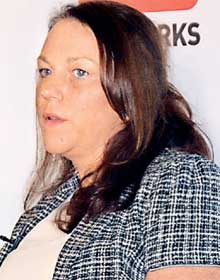 the long-term sustainability of the economy and the self-sufficiency of the country.
the long-term sustainability of the economy and the self-sufficiency of the country.
“There is a significant lack of focus on structural changes to the tax to make a change for the difference in the long term, especially in focusing on how to make money in the next year, as opposed to the investing for the sustainability into the longer term,” she added.
She asserted that there appear to be amendments to existing structures, which is unlikely to bring significant increase in revenues, but will cannibalise existing revenues in the existing pie as opposed to creating a bigger pie to get a share from.
According to her, the future for Sri Lanka will rely on the ability to attract tourism, improve productivity of agriculture, improving the labour market efficiencies and filling skill gaps in the workforce.
However, in her view, the 2017 Budget fails to address these issues with the allocation to both education and health being reduced, and although national food production and less reliance on importation is mentioned, the tools to implement such a change are amiss in the reforms.
She pointed out that although the reforms are beneficial on paper for foreign investment and companies locating to Sri Lanka, they will only be successful if the focus is put on infrastructure and basic sanitation and providing the right social and economic climate in the country – starting with addressing the divide between the affluent and providing a safety net for the poor.
“I think education and health are actually two key services that have maintained high standards and something for Sri Lanka to be proud of. These two areas need to be improving, and not to stop that investment,” she noted.
Noting that there are some positives in the Budget such as Dividend Tax, Capital Gains Tax and higher Income Tax rates that start to address the vast and extremely pronounced economic gap between the rich and poor in Sri Lanka, she said the benefits of these taxes on the incremental that the affluent are privy to appears to be outweighed by the impact on the general population of the increase in VAT, and removal of exclusions in regards to this as well as increased levies in regards to internet and telecoms.
“These changes will have a significant impact on the lower income earners where the struggle to obtain the basic consumer items will be under pressure. With regard to tobacco specifically, there has been an increase of 42% in the last two months alone, which will not only have an impact on disposable incomes, but also the derivation of Government revenues as consumption declines,” she stated.
She emphasised that CTC, as part of the larger BAT group has access to a magnitude of great research in regards to consumers and the impact of excise and tax changes globally that would be of use to the Government when working through plans, particularly in regards to stretching consumers. “CTC, as well as many other companies, would like to work in collaboration with the Government to ensure a sustainable, predictable future for the company,” Ridley added.
Speaking on the policies and reforms that would impact the pharmaceutical industry, Glaxo SmithKline Consumer Chairman Sunil Mehra outlined three key barriers including scale, skills and concessions which needs immediate attention. 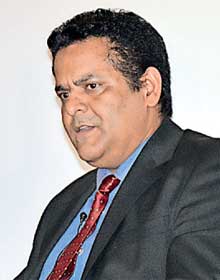
He said the Government’s focus to capitalise on India, China, Singapore and Pakistan for FTAs is going to be a game changer which will give market access to three billion and pointed that if addressed properly could result in attracting FDIs.
According to him over 80% of the medicines that are used locally are imported and Sri Lanka has a very small local manufacturing market of about 16%.
Although there is a lot of discussion about educational reforms and focus on skill development, he questioned on the pace of these proposals being implemented and whether the skills development are in line with what country and industry needs.
“Skill development coupled with scale is the key to success any FDI attraction. Proof lies in the pudding, we will get to know in the future,” he added.
He stressed more focus on getting the right concession for duties especially for raw material and machinery will perhaps result in Sri Lanka becoming a hub that can provide affordable medicine.
“From a pharmaceutical industry we could get the scale and skills, but for our future proposals we may start to look at some more concessions from a backward integration perspective. It will be for raw materials and machinery. If these can be provided it would perhaps result in Sri Lanka becoming a hub, which can provide affordable medicine,” he noted.
Mehra also said that they look for more clarity on the concessions the companies would get by setting up in the proposed free trade zones, which is at of macro stage now.
Piramal Glass Ceylon Plc Managing Director/CEO Sanjay Tiwari commended 2017 Budget for encouraging for FDIs and 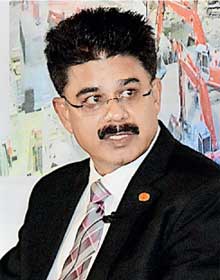 manufacturing sector while noting that there were significant consistency and improvements over the previous Budgets.
manufacturing sector while noting that there were significant consistency and improvements over the previous Budgets.
Capital allowance, removal of SVAT, increase of Custom duty for some import products, incentives for incremental exports by way of a tax exemption, relaxation of land alienation, Registrar of Companies working for seven days were highlighted as key encouraging proposals for the FDIs and manufacturers, but noted that they could be further address it over the next few years.
As an existing foreign investor in the country, Tiwari said they expect more policy consistency and encouragement to reinvest or expand their base.
Comparing major points of manufacturing setup in India and Sri Lanka he said that linking fuel prices to international crude oil prices and directing Customs to work 100% for non-export units and duty draw back or import licenses against exports would highly encourage the manufacturing setup to go for more exports.
Highlighting that 2017 Budget has announced incentives for strategic investments and new investments linked with employment, he said in an era of technology and automation it was not reasonable to consider job creation as a key criteria for incentives.
“As labour intensive industries we all are moving more and more into automation. Hence, employing 200 to 300 people is a big number. We can have employment of 5,000 to 10,000 in garment industry, but for an industrial setup like us 100 to 200 employment with an investment of $100 to $150 million is a sizeable number. I think that needs to be addressed,” Tiwari pointed out.
He also said though employment is outlined as one of the key elements, the number of employment mentioned is still not very clear.
Sharing remarks from a Japanese business community’s perspective of the Budget 2017, Japan International Cooperation Agency 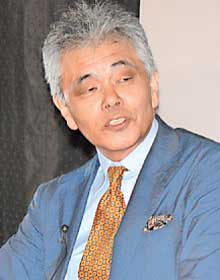 (JICA) Advisor for Board of Investment (BoI) Hideo Horiguchi said the overall tax and business climate in Sri Lanka is laudable. “Tax situation and total business climate is relatively good,” he said.
(JICA) Advisor for Board of Investment (BoI) Hideo Horiguchi said the overall tax and business climate in Sri Lanka is laudable. “Tax situation and total business climate is relatively good,” he said.
However in terms of taxes related to import trade facilitation there are a few confusions.
Stating a few comments outside the Budget he said the Japanese business community has a great opportunity to plug into the large markets as Sri Lanka plans to extend its FTA with India in the near future.
“Traditionally the Japanese business community did not consider FTA networks, but with globalisation, I think they must consider FTAs. They can produce here and export to India,” he added.
However, he said that it was not so easy to satisfy the product origin criteria of 35% and as such he would propose to the Japanese business community in Sri Lanka to directly contact local suppliers and make stronger partnerships.
Horiguchi also pointed that Sri Lanka has a better chance to plug into the mega FTA – Trans-Pacific Partnership (TPP) agreement among 12 of the Pacific Rim countries or Regional Comprehensive Economic Partnership (RCEP): ASEAN +6.
“I think Sri Lanka can get involved directly or indirectly with mega FTA network in future,” he said.
Pricewater house Coopers Director Tax Services Charmaine Tillekeratne said this year’s Budget proposals focused on simplifying and widening the tax base.
Pointing that Sri Lanka’s tax to GDP ratio is very low, she said it was important that the Government increase it.
“The only request is taking into account these sweeping exemptions and analyse it for each sector and maybe restrict the exemptions to certain sectors without taking it out completely, especially for triple deduction for R&D and IT/BPOs,” Tillekeratne said.
HSBC Sri Lanka and the Maldives CEO Mark Prothero said the Budget clearly outlines the Government’s objectives of building a 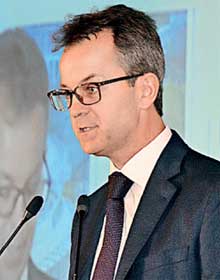 strong economy and a fair society where there is security and opportunity for all adding that if executed well, this will facilitate the creation of one million jobs, doubling percapita income and achieving a GDP growth rate of 7% by 2025.
strong economy and a fair society where there is security and opportunity for all adding that if executed well, this will facilitate the creation of one million jobs, doubling percapita income and achieving a GDP growth rate of 7% by 2025.
“We at HSBC, believe that Sri Lanka has much to gain from its strategic location in Asia. She’s positioned centrally along the maritime silk route and therefore an integral part of China’s ‘One Belt: One Road’ initiative to increase investment and foster international collaborations,” he added.
According to him trade volumes between China and countries connected by the initiative are expected surpass $2.5 trillion over the next decade. Already China’s overseas investments in non-financial sectors in the first nine months of 2016 total $134.2 billion.
Noting that he has been in Sri Lanka for five short weeks, Prothero has already learned about the many potential opportunities ahead of the country which touches upon all aspects of the infrastructure and construction value chain Governments to contractors, investors, equipment manufacturers, commodity producers and so on.
“We are now entering perhaps the greatest period of economic opportunity in Sri Lanka’s history and both the public and private sectors need to work together to grasp it. As we in HSBC approach our 125th year in Sri Lanka we are excited to support her continued growth and development,” the HSBC CEO add.
“As part of Sri Lanka’s roots, we have been and are committed to her development with our local presence and our international presence. We take great pride in connecting customers to opportunities, enabling businesses to thrive and the economy of the nation to prosper and helping people to fulfill their hopes and dreams and realizing their ambitions,” he stressed. Furthermore he asserted that HSBC, the leading international bank in Sri Lanka was proud to partner with the Daily FT and University of Colombo MBAA to focus on the 2017 Budget to shape and redefine their path with its economic policies and initiatives. Pix by Daminda Harsha Perera and Upul Abayakseara